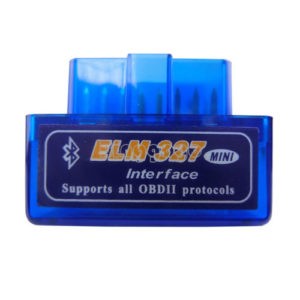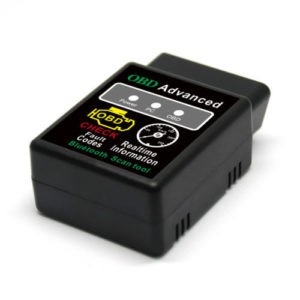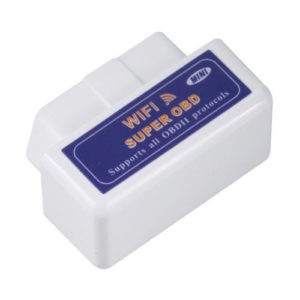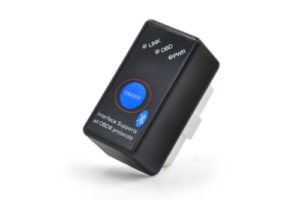For car enthusiasts and everyday drivers alike, understanding your vehicle’s health is becoming increasingly accessible thanks to OBD2 (On-Board Diagnostics II) scanners. At the heart of many affordable and user-friendly diagnostic tools is the Elm327 Obd2 Scanner chip. These scanners, when paired with software on your smartphone, tablet, or computer, can unlock a wealth of information about your car’s performance and potential issues.
The ELM327 OBD2 scanner acts as a crucial communication bridge between your chosen software application and your car’s Engine Control Unit (ECU). Selecting the right adapter is paramount, influencing not only whether you can connect to your vehicle successfully but also the reliability and speed of that connection. A quality ELM327 OBD2 scanner can empower you to read diagnostic trouble codes, monitor real-time engine data, and gain valuable insights into your vehicle’s operation.
If you’re looking for a quick recommendation on where to buy a reliable scanner, feel free to jump to our recommendations below. However, understanding the nuances of ELM327 OBD2 scanners will ensure you make an informed decision and get the best tool for your diagnostic needs.
Understanding ELM327 OBD2 Adapters
When navigating the world of ELM327 OBD2 scanners, two key considerations come into play:
- Compatibility with your device: The adapter must be compatible with your smartphone or tablet’s operating system. This mainly depends on the connection type the scanner utilizes.
- Adapter Quality: The ELM327 OBD2 scanner needs to be reliable and function correctly, accurately relaying data and commands. A low-quality adapter can lead to frustration and inaccurate readings.
Let’s delve into the different connection types available for ELM327 OBD2 scanners:
Connection Types for ELM327 OBD2 Scanners
ELM327 OBD2 scanners primarily connect wirelessly, offering different options to suit various devices and user preferences:
- WiFi: ELM327 OBD2 scanners using WiFi create their own wireless network for your device to connect to.
- Bluetooth Classic (Versions 1.x, 2.x, 3.x): Traditional Bluetooth, widely compatible with Android devices.
- Bluetooth Low Energy (LE) (Version 4.0 and above): Bluetooth LE, designed for low power consumption, is essential for modern iOS devices and also compatible with Android. It’s important to note that Bluetooth and Bluetooth LE are distinct communication protocols despite the similar name.
- Bluetooth MFi (Made for iPhone/iPad): A specific type of Bluetooth Classic that requires manufacturer certification from Apple for guaranteed compatibility with iOS devices. These are less common and often premium options like OBDLink MX+ and vLinker FS. On Android, they function as standard Bluetooth adapters.
- USB: While some OBD2 scanners use USB, ELM327 OBD2 scanners for mobile use are typically wireless. USB connectivity is not commonly supported with ELM327 chips in smartphone-based applications.
The best connection type largely depends on your smartphone or tablet’s operating system.
ELM327 OBD2 Scanners and Apple iOS (iPhone/iPad)
Apple iOS devices, including iPhones and iPads, are compatible with Bluetooth LE (4.0), Wi-Fi, and Bluetooth MFi ELM327 OBD2 scanners. However, due to Apple’s iOS limitations, classic Bluetooth adapters (versions 1.x, 2.x, 3.x) are not compatible with iPhones or iPads. This is a fundamental restriction within the iOS operating system.
Recommended Connection for iOS: Bluetooth LE (4.0)
Bluetooth LE ELM327 OBD2 scanners offer the most user-friendly and reliable connection for iOS devices. They are readily available, provide a good balance of data transfer speed and ease of use. While Bluetooth MFi adapters offer top-tier performance, they often come at a higher price. WiFi adapters, while compatible, can sometimes introduce connection complexities and may interfere with your mobile data.
Crucial Note for iPhone/iPad Users: Bluetooth Version!
It’s vital to verify the Bluetooth version when purchasing an ELM327 OBD2 scanner for iOS. Many users mistakenly buy classic Bluetooth adapters, only to find they are incompatible with their iPhones or iPads. This limitation is inherent to iOS and affects all OBD2 applications.
ELM327 OBD2 Scanners and Google Android
Android devices offer broader compatibility, supporting ELM327 OBD2 scanners with classic Bluetooth (versions 1.x, 2.x, 3.x), Bluetooth LE (4.0), and Wi-Fi.
Recommended Connection for Android: Classic Bluetooth
For Android users, classic Bluetooth ELM327 OBD2 scanners are generally recommended. They often provide faster data transfer speeds than Bluetooth LE and tend to be more stable than Wi-Fi connections. A vast majority of Android users successfully utilize classic Bluetooth adapters.
Potential Drawback: Some Android devices might experience conflicts when multiple Bluetooth devices are connected simultaneously, such as an OBD2 scanner and a car’s Bluetooth multimedia system.
Quality Considerations When Choosing an ELM327 OBD2 Scanner
Forget outdated advice about specific ELM327 versions, chips, or circuit board counts. This information is no longer a reliable indicator of quality. Counterfeiters have become adept at replicating these superficial features. Similarly, quality manufacturers are producing reliable ELM327 OBD2 scanners using diverse components. The version number on many clone adapters is often arbitrary and meaningless.
The critical distinction now lies between “good” and “bad” ELM327 OBD2 scanners. A “good” adapter simply works reliably as intended, without glitches or freezes. Your primary goal is to identify and purchase a quality ELM327 OBD2 scanner. “Bad” adapters, on the other hand, are plagued with various issues.
Problems with Low-Quality ELM327 OBD2 Scanners
Using a substandard ELM327 OBD2 scanner can lead to numerous problems, including:
- Complete Failure: The adapter may not function at all.
- Unstable Operation: Intermittent connectivity issues, freezing, spontaneous reboots, or failure under varying temperature or humidity conditions. Inconsistent performance, working one day but failing to connect or provide complete data the next.
- Limited Command Support: Incomplete implementation of OBD2 command sets, despite falsely advertising full support.
- Fixed ECU Address: Inability to communicate with different ECUs beyond a pre-programmed address, limiting diagnostic scope.
- Data Length Restrictions: Limitations on the size of data requests and responses, hindering comprehensive data retrieval.
- Data Loss: Incomplete data transmission, missing packets leading to corrupted and undecipherable information.
- Data Corruption: Data distortion during transmission, potentially leading to incorrect commands being sent to the ECU (e.g., accidentally triggering memory erasure instead of a sensor reading).
- Protocol Incompatibility: Limited support for OBD2 communication protocols, rendering the adapter useless with vehicles using unsupported protocols.
- On-Board Network Interference: “Bad” ELM327 OBD2 scanners can disrupt the vehicle’s communication network by sending spurious data or requests, potentially affecting engine performance and causing issues like engine roughness.
- Critical Failures in Advanced Functions: For users interested in advanced features like ECU coding or service procedures, a high-quality ELM327 OBD2 scanner is essential. Low-quality adapters can lead to failed operations or, worse, corrupting ECU data, potentially causing severe vehicle malfunctions.
The Overwhelming Problem: Prevalence of Bad Adapters
The market is unfortunately saturated with low-quality ELM327 OBD2 scanners. You might encounter multiple faulty adapters before finding a reliable one. This makes choosing a reputable brand and model crucial.
 bad elm1
bad elm1
 bad elm2
bad elm2
 bad elm3
bad elm3
 bad elm4
bad elm4
 bad elm5
bad elm5
Examples of low-quality ELM327 OBD2 scanners to avoid, known for their unreliable performance and potential issues.
Recommended ELM327 OBD2 Adapters for Reliable Diagnostics
Disclaimer: We do not sell OBD2 adapters. Our recommendations are based on extensive experience and feedback from Car Scanner app users.
Here are some recommended ELM327 OBD2 scanners, listed roughly from most expensive to more affordable options:
-
OBDLink MX+ with Bluetooth MFi (#ad link): Around $100 USD. Compatible with both iOS and Android. Top-of-the-line adapter with advanced features and performance.
-
OBDLink CX with Bluetooth LE (#ad link): Approximately $80-100 USD. iOS and Android compatible. Features a large memory buffer and excellent performance.
-
vLinker MC+ with Bluetooth LE (#ad link), vLinker FS with Bluetooth MFi (#ad link), vLinker MS with Bluetooth MFi: vLinker devices offer a range of reliable ELM327 OBD2 scanners. MC/MC+ (Bluetooth LE) and FS/MS (Bluetooth MFi) are recommended for iOS, while any vLinker model is suitable for Android. Firmware updates are important for early vLinker models, available on the manufacturer’s website.
-
Vgate iCar Pro 2S: A newer, improved version of the iCar Pro BLE, offering enhanced performance.
-
Vgate iCar Pro BLE (#ad link): Features Bluetooth 2.0 + Bluetooth 4.0 for broad compatibility (iOS, Android, Windows). Firmware updates (version 4.1.02 and later) are crucial for correct CAN Extended addressing support, especially for Toyota and BMW vehicles. Firmware updates can be downloaded here.
ELM327 OBD2 Adapters to Avoid
Steer clear of these ELM327 OBD2 scanners and brands known for poor quality or compatibility issues:
- xTool adapters: Proprietary and incompatible with the ELM327 standard, only working with xTool software.
- Wired (USB, COM) adapters: Car Scanner and similar mobile apps primarily support wireless adapters.
- “Mini” adapters: Adapters with “mini” in their name are overwhelmingly likely to be low quality.
- Extremely cheap adapters: Significantly low prices often indicate compromised quality.
- Adapters with Bluetooth MAC addresses starting with 11:22:33 or 00:00:00: These are often associated with unreliable clones.
- KONNWEI devices: While previously recommended, recent KONNWEI adapters have shown decreased quality and data loss issues.
- “Micro Mechanic” adapters: Known for premature failure after short usage periods.
- “THINMI.COM” adapters: Limited ELM327 command support and frequent fake responses.
- KUULAA brand adapters.
- Adapters with a specific generic design (pictured above): While some may be functional, most with this design are of very low quality.
By understanding the types, quality concerns, and recommended models of ELM327 OBD2 scanners, you can confidently choose the right tool for diagnosing your vehicle and gaining valuable insights into its health.
Disclaimer: As an Amazon Associate, I earn from qualifying purchases through the provided affiliate links.